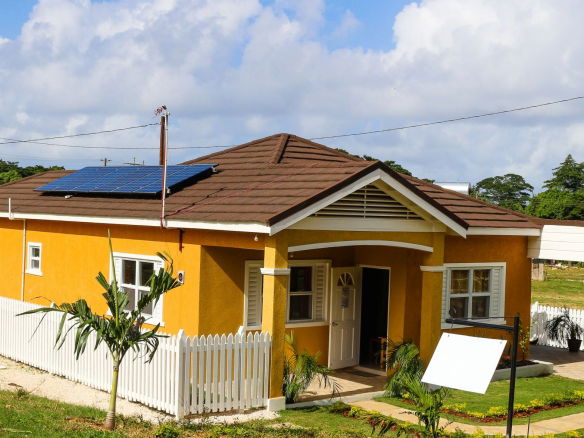Affordable housing remains a pressing issue in Jamaica, with rising land and construction costs making homeownership increasingly difficult for many citizens. The demand for low-to-middle-income housing continues to outpace supply, leading to informal settlements, housing insecurity, and financial strain on families. To address this challenge, a mix of policy reforms, innovative construction methods, and public-private collaborations are essential. Here are five key solutions that could help make housing more affordable and accessible across Jamaica.
Table of Contents
- 1. Expansion of the National Housing Trust (NHT) Initiatives
- 2. Alternative Housing Solutions: Prefab and Container Homes
- 3. Land Regularization and Squatter Amnesty
- 4. Public-Private Partnerships (PPPs) in Housing Development
- 5. Zoning Reforms and Infrastructure Development
- Conclusion
- Frequently Asked Questions
1. Expansion of the National Housing Trust (NHT) Initiatives
The National Housing Trust (NHT) plays a crucial role in providing affordable housing to Jamaicans. However, concerns have been raised regarding the distribution of NHT benefits, with some arguing that middle- and high-income earners have better access to financing than lower-income families. Recent policy changes have sought to address these imbalances by increasing loan limits, reducing interest rates, and enabling up to three individuals to combine resources to qualify for mortgages.
Additionally, the government has restructured the NHT to focus primarily on low-income and affordable housing solutions. Moving forward, leveraging NHT’s surplus funds estimated at JMD 20 billion annually, toward large-scale affordable housing developments could significantly impact accessibility for low-income earners.
2. Alternative Housing Solutions: Prefab and Container Homes
Traditional concrete and steel housing methods are costly and time-consuming. As an alternative, prefabricated (prefab) homes and container homes have emerged as cost-effective and sustainable solutions.
- Prefab homes: These are built in sections offsite and then assembled at the final location. They are more affordable due to reduced labor and material costs, quicker construction timelines, and enhanced energy efficiency.
- Container homes: Shipping containers are repurposed into housing units, offering a durable, weather-resistant, and cost-effective option. A fully insulated and finished one-bedroom unit can cost as little as JMD 2.5 million, significantly lower than traditional homes.
Both options are suited for urban and rural areas, particularly where infrastructure is already in place. The government and private sector can collaborate to promote these housing models as viable alternatives for first-time homeowners.
3. Land Regularization and Squatter Amnesty
Jamaica has a high number of informal settlements, with thousands living in unregulated housing. A structured amnesty program for squatters, coupled with land regularization efforts, could provide a pathway for these residents to legally own their homes.
A proposed five-year amnesty program would allow squatters to enter a structured agreement with the government, paying towards land ownership over a set period. This strategy, alongside infrastructural investments in these communities, can transform informal settlements into regulated neighborhoods, improving safety and living conditions.
Governments in the Caribbean, such as Guyana and Suriname, have successfully regularized informal settlements by providing land tenure security, infrastructure, and access to micro-financing for home improvements. Jamaica could adopt similar approaches, ensuring that housing solutions extend to the most vulnerable populations.
4. Public-Private Partnerships (PPPs) in Housing Development
Governments alone cannot meet Jamaica’s housing needs. Public-Private Partnerships (PPPs) allow for shared investment, reducing the financial burden on both the state and private developers.
Successful PPP models have emerged across the Caribbean, where governments provide land at reduced costs while private developers handle construction and financing. This model ensures that housing projects remain both affordable and commercially viable.
In addition, rent-to-own schemes, where residents gradually transition from renters to homeowners, can provide accessible pathways to ownership for lower-income Jamaicans. By encouraging private developers to integrate rent-to-own models into their projects, Jamaica can enhance affordability while ensuring sustainable returns for investors.
5. Zoning Reforms and Infrastructure Development
Outdated zoning regulations have limited housing development options in Jamaica. Modernizing zoning laws to allow for higher-density housing, mixed-use developments, and more efficient land use can facilitate the construction of affordable homes.
Key strategies include:
- Upzoning: Allowing for the development of multi-family housing units, such as duplexes and townhouses, in areas traditionally zoned for single-family homes.
- Adaptive reuse of buildings: Transforming underutilized government buildings, commercial properties, and vacant lots into housing units.
- Government-backed infrastructure development: Ensuring that water, sewage, and road infrastructure are extended to designated housing zones to reduce developers’ costs.
By integrating climate-resilient designs, such as hurricane-resistant roofing and flood-proof housing, new housing developments can be made both affordable and sustainable, safeguarding investments against natural disasters.
Conclusion
Affordable housing in Jamaica requires a multi-faceted approach that combines financial reforms, innovative construction techniques, legal regularization, public-private partnerships, and improved zoning laws. As the country urbanizes, the demand for housing will only grow, making it imperative to implement long-term, scalable solutions. By embracing these strategies, Jamaica can move closer to ensuring that every citizen has access to safe, affordable, and sustainable housing, a cornerstone of national development and economic stability.
For more real estate insights and housing opportunities in Jamaica, visit NewLocay.com, your trusted partner in property solutions.
Frequently Asked Questions
What is the biggest challenge to affordable housing in Jamaica?
The biggest challenge is the rising cost of land and construction, making homeownership difficult for low- to middle-income families. Additionally, outdated zoning laws, lack of financing options, and informal settlements contribute to the housing crisis.
Are container homes a viable affordable housing solution in Jamaica?
Yes, container homes offer a cost-effective and durable alternative to traditional housing. They are weather-resistant, quick to construct, and can be customized for insulation and ventilation, making them suitable for Jamaica’s climate.
How does the National Housing Trust (NHT) help with affordable housing?
The NHT provides low-interest mortgages, financial assistance, and subsidized housing solutions to eligible Jamaicans. Recent reforms have increased loan limits and introduced policies favoring lower-income households.
What are Public-Private Partnerships (PPPs) in housing development?
PPPs involve collaboration between the government and private developers to fund and build affordable housing. The government may provide land or incentives, while developers handle construction and financing, ensuring sustainable housing options.





